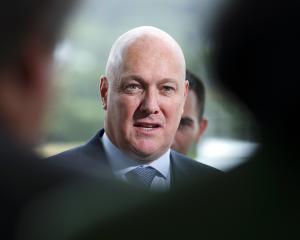‘‘D’’ is a fail grade at the University of Otago. It is a fail at its Department of Marketing and it is a fail at its Department of Tourism.
Trainee marketers, trainee tourism managers and trainee tourism marketers know a ‘‘D’’ is nothing to aspire to. A mark of between 40% and 49% pleases no-one.
A ‘‘D’’ grade does not scream ‘‘success’’. Instead, it says in a mildly condescending tone, ‘‘oh, you were so very close — but you’re not quite up to it, are you’’.
The Dunedin City Council reinforces the universal aversion to a D when it grades food premises. A restaurant with a D grade is neither excellent nor good. It is not even acceptable — it is poor — and it has to display a dark black D on its window to let us know it has failed to meet the council’s standards.
A ‘‘Plan D’’ inhabits the same hemisphere. If ‘‘Plan A’’ is the optimal preference, then ‘‘Plan D’’ is the suboptimal, much poorer, seldom-sought, third cousin.
So, it is little wonder so many Dunedin people were flummoxed when the council’s tourism marketing arm co-opted a letter so thick with connotation.
Enterprise Dunedin’s ‘‘Dunedin, a pretty good Plan D’’ campaign was launched to reinvigorate the city’s post-lockdown, pandemic-hit tourism trade. The marketers called it intriguing and high impact, deliberately self-deprecating and wryly humorous. They called it edgy; others called it brave, given the connotations, or even stupid.
It certainly set tongues wagging. On news websites, on social media and in letters to the editor, many have blasted the $145,000 campaign as a costly embarrassment.
They say it devalues the city they call home. The campaign, they suggest, tells the world Dunedin is nothing more than a quaint, low-grade also-ran.
Others see its merits. On the same online platforms, they call the campaign a breath of fresh air, understated and charming. The marketers will note many of them are from outside Dunedin.
Enterprise Dunedin director John Christie expected a mixed reaction, but said what mattered was that the campaign got ‘‘cut-through’’ in an increasingly competitive domestic tourism market.
It is, after all, a campaign whose biggest focus is to encourage people to visit Dunedin — the same people whose pre-pandemic Plan As may have been trips to exotic locales overseas.
It needed to be memorable. By the end of the week, news of the campaign had been splashed across the front pages of all the leading news websites in New Zealand. It made prime-time television news, and it was filler-fodder for innumerable radio hosts on national and local networks across the country. Granted, many reports were quizzical critiques of the campaign’s name, as much as they were about new moves to attract new tourists to Dunedin.
Some compared the campaign name to the myriad, and usually dreadful, town slogans that have slipped in and out of the national lexicon. It was no Edinburgh of the South, some said, but at least it was not a reprise of the unfortunate but, sadly, unforgettable ‘‘It’s all right here’’.
But no matter what was said, the material that supported the news stories did what the marketers would have wanted. Many stories were illustrated with visuals prepared for the campaign. Remarkable scenes of a remarkable city played before thousands of eyes.
‘‘It’s like Bali, but with wetsuits’’ might annoy for its reference to the city’s sometimes chilly climate, but the beach scenes are raw and stunning. ‘‘It’s not exactly Edinburgh, but it sort of is’’ might be self-deprecating, but video featuring the city’s historic architecture sets it apart.
The wry understatements are manifestly overtaken by the campaign’s raw material: the city itself. This is deliberate and clever, and it has to be noticed in the regions vying to get domestic tourists to visit their own slice of paradise.
The campaign’s name is not a slogan to validate (or invalidate) the pride people have in their city. Instead, it hints at the way New Zealand has presented itself to the world, over many decades: there are bigger mountains and bigger cities in the world — but what we’ve got will surprise you.
Comments
Come on! It's a total sham as is this article! You seem to forget at some point international tourism will resume and the people of Dunedin are stuck with this idiotic mantra. If you owned a tourism-related business would you want this as a marketing plan? It's not trendy or edgy or anything else but total crap! One would think given the severity of the NZ economy and the decline in tourism that the "professionals" would come up with a real marketing plan. The Mayor and DCC are slowly turning Dunedin into a third world dump. The people living here have become apathetic and dont care about living in a dump!












